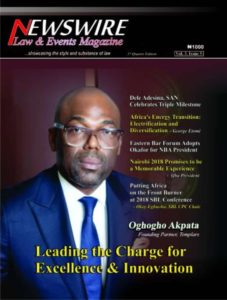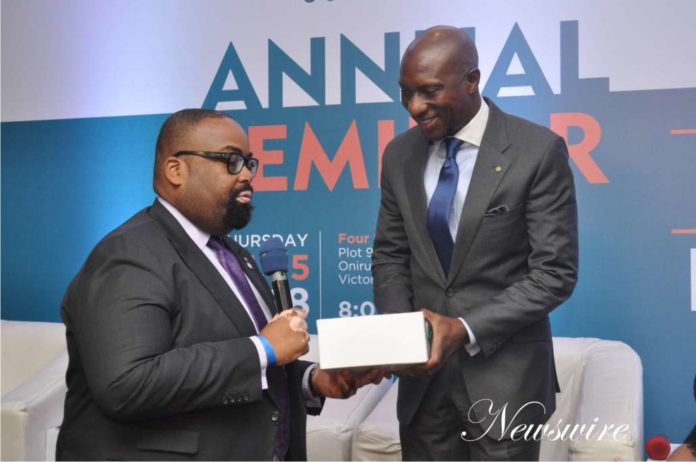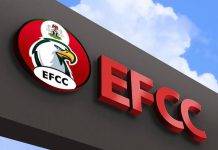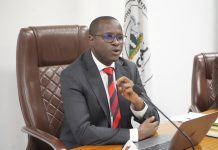Mergers & Acquisitions in Focus at Annual NBA-SBL Seminar in Lagos
Mergers and acquisitions (more commonly known as M&As) are transactions in which the ownership of companies, other business organizations, or their operating units are transferred or combined. From a legal point of view, a merger is a legal consolidation of two entities into one entity, whereas an acquisition occurs when one entity takes ownership of another entity’s stock, equity interests or assets.

The Nigerian business environment is no stranger to mergers and acquisitions, especially in the financial services, oil and gas and telecommunications sectors. But analysts are of the unanimous view that these mergers and acquisitions investment transactions are too few comparative to the huge potentials and positive fundamentals of the Nigerian economy, which is projected to obtain the highest average GDP growth in the world in the next forty years. Currently the largest economy in West Africa and the second largest in Africa, the Nigerian economy, due to its size and strategic location is rightly regarded as a major port of entry into other parts of Africa. In addition, the country offers increasing better incentives for foreign participation in the economy, as efforts by the relevant authorities aimed at to improve Nigeria’s ease-of-doing-business profile begin to bear fruit.
NEWSWIRE Law & Events Magazine correspondent in Lagos reports that it was in light of this perceived dearth of M&A transactions viz-a-vis the country’s robust economic profile, and in recognition of the urgent need to ameliorate this disparity, that the Nigerian Bar Association’s Section on Business Law (NBA-SBL) convened its annual seminar in Lagos. Held at the impressive Four Points by Sheraton Hotel in the upscale Lekki suburb of Lagos under the theme, ‘Recurring Issues in Mergers & Acquisitions in Nigeria,’ the event was graced by a number of heavyweights in the legal profession and leading players in the financial services sector, as well as representatives of regulatory bodies in Nigeria – notable among them the acting Director-General of Nigeria’s securities and exchange commission (SEC), Mrs. Mary Uduk, the Chief Executive Officer of the Nigerian Stock Exchange (NSE), Mr. Oscar Onyema, OON, and the Chairman of the NBA-SBL, Mr. Olumide Akpata.
A large contingent of young lawyers from various law firms in and around the Lagos metropolis was also in attendance.
In her remarks of welcoming, the chairman of the NBA-SBL Mergers, Acquisitions and Corporate Reorganizations Committee – which convened the seminar – Mrs. Olayemi Anyanechi reiterated that though the Nigerian economy was technically out of its recent recession, businesses and livelihoods were still feeling its lingering effects. Still, she said, there was a considerable disconnect between the economic growth profile and the relatively small number of M&A and related investments being concluded in the country. ‘What are we missing?’ she asked, tasking the participants in the panel discussions to follow, to unravel this seeming paradox and proffer ways of removing the cultural, procedural and regulatory bottlenecks holding back M&A transactions in the Nigerian market.
Echoing Mrs. Anyanechi’s sentiments, the chairman of the NBA-SBL, Mr. Olumide Akpata stressed the need to build capacity across the legal profession – and among commercial lawyers in particular – which the SBL has been engaged in since its inception 14 years ago. Today, he said, the SBL, through its 18 committees, is busier than ever, with high-impact activities and programmes (including seminars and conferences) virtually all-year round. On the theme of the seminar, the SBL chair urged discussants to emphasize the enhancement of capacity among commercial lawyers in the country, in a manner that maximizes their ability to opportunities offered by the country’s drive towards privatization and deregulation of key sectors of the economy.
Goodwill messages were delivered at the occasion by the new acting D-G of the Securities and Exchange Commission (SEC), and the CEO of the Nigerian stock exchange (NSE), in which they proclaimed their shared objectives, along with the SBL, in making the Nigerian business environment more investor-friendly. They praised the NBA for its historic role as a catalyst for national development, including its interventions in defending and enhancing the SEC’s and NSE’s investor-protection mandates.
In recent years numerous successful deals have been concluded in Nigeria. In the Nigerian context, a business combination may take the form of a merger, a purchase of shares, an acquisition of assets or an arrangement, compromise or reconstruction amongst or between companies. Business combinations are generally subject to the approval of the Securities and Exchange Commission (SEC) and the principal law that regulates business combinations in Nigeria is the Investments and Securities Act 2007 (ISA 2007), along with the Rules and Regulations of the Securities and Exchange Commission (SEC Rules). In his presentation on the general overview of the M&A space in Nigeria, Dapo Okubadejo – a Partner and head, Deal Advisory and private equity at KPMG, a global network of professional firms providing audit, tax and advisory services – enumerated the four major kinds of M&A transactions to include the vertical, horizontal. conglomerate and concentric, and its motivations to include the desire for market share, synergy, financial, value and regulatory advantage. Okubadejo also listed recent trends in the M&A space in the last five years or so, as well as both the challenges and the opportunity that abound in the sector. Going forward, he identified the following macro-economic variables as potential drivers of increased M&A activity in Nigeria: strong and sustained GDP growth; stable and high global commodity prices; foreign exchange stability; and stable inflation, as well as regulatory policy changes and far-reaching public-sector reforms.
NEWSWIRE’s correspondent reports that the first discussion panel of the day was mandated to explore the topic, ‘Current Developments in Mergers in Nigeria.’ It was moderated by the chairman of the NBA-SBL Mergers, Acquisitions and Corporate Reorganizations Committee; Mrs. Olayemi Anyanechi, who is also the Managing Partner of Selfton Fross, a law firm specializing in business and finance law, where she is in charge of the firm’s banking and finance, and energy and infrastructure practice. Over the years, she has advised in a significant number of the largest and most sophisticated transactions across diverse industry sectors in Nigeria.
Anyanechi also sits on the Editorial Board of the Financial Regulation International. Her panel comprised Johnson Chukwu (CEO, Cowry Asset Management Limited); Sunday Oroleke (Legal Adviser, Leadway Assurance Co. Ltd.); Rachel Olenloa, an Assistant Director at the SEC); Isa Alade (Partner at the law firm of Banwo & Ighodalo); and Tolu Osinibi, Executive Director, FCMB Capital Markets Ltd.). The panelists identified a number of factors militating against the increase in mergers in Nigeria, which includes the fear of the loss of influence among business owners. They also saw no need for established industry like Leadway Assurance to merge with smaller competitors, but every reason for said smaller businesses to do so, as a way of increasing their share of the market, and in some cases to ensure their survival. They also raised a number of questions about the regulatory role of the SEC and its applicable of rules in specific areas, or governing specific activities. Mrs. Olenloa of the SEC was only too address these questions and objections head-on.
The second session of the day was a solo presentation by John Basnage. Basnage is the Managing Partner of the UK-based law firm, Anthem Advisory, where his practice area is primarily transactional and focuses on capital markets, international mergers and acquisitions, and general corporate advice to private and public companies. He spoke on the topic “Overview of the M&A Market – Issues and Trends” in which he brought his experience of jurisdictions such as the United States, the United Kingdom and the European Union, among others, to make comparisons and contrasts as well as recommendations for the Nigerian market.
After a short tea break, participants returned for the third session of the day which was centered on the topic, ‘Acquisition Structures, Current Trends and Regulatory Challenges,’ and moderated by Mrs. Christine Sijuade (Managing Associate, Udo-Udoma & Belo-Osagie). She was assisted by a panel consisting of Ben Unaegbunam (Partner at Adepetun Caxton-Martin Agbor&Segun, or ACAS Law); Alex Osho (Head, Financial Advisory at FBN Capital); Kemi Awodein (the managing director of the law firm of Chapel Hill Denham); Chinyereugo Ugoji (a Partner at Aelex); and Segun Onakomaiya (Vice-President at Synergy Capital Markets).
Like Dapo Okubadejo and John Basnage before her, Mrs. Kemi Awodein of Chapel Hill Denham anchored Session Four on her own, titled “Case Study in Acquisitions,” in which she presented succinct examples of her firm’s successful management and advisory engagement in selected acquisitions transactions in a recent period. She also took a number of questions from attendees on some of the issues she raised in her presentation.
“External Restructuring as a Process for Value Enhancement Within Group Companies” was the theme of the fifth session of the seminar, which was moderated by Folasade Olusanya (a Partner at Jackson, Etti & Edu). Her discussion panel was a veritable assemblage of high-flyers such as the aforementioned Rachel Olenloa (Assistant Director at the SEC, who was sitting in on her second panel discussion and would sit on one more before the day was done); Olufemi Alabi (Partner, Transaction Advisory Services at EY Nigeria); Sola Carrena (the head of Financial Advisory at Stanbic IBTC Capital Ltd.); Ogonna Chinedu-Eze (a Legal & Compliance Counsel at Lafarge Africa Plc); as well as Zelda Akindele (a Partner at Templars). In a rather animated conversation, the panelists warned of the dangers of ‘over-regulation’ on the part of the SEC. They took the Commission to task over its interpretation of anti-trust rules as well as issues around schemes and external restructuring, among others.
This was followed by yet another solo presentation, this time by Jubril Enakele, who is the managing director of Zenith Capital Ltd. Enakele, a veteran fund manager with extensive experience in international organizations such as Deutsche Bank, etc., spoke on the topic, “Case Study on Corporate Restructuring.” Corporate organizations, he maintained during his presentation, must take the following imperatives into consideration if they are to remain viable and competitive in the long term: they must commit substantial funds for expansion; they must constantly seek to improve their governance standards; they must boost their general standards – including product quality as well as human capital development; and they must maintain an excellent record of high environmental performance.
No less engaging was the seventh and last session of the day, which took the form of a regulator question-and-answer session. Moderated by Babajimi Ayorinde (a Partner at The New Practice), who was assisted once again by the SEC’s Rachel Olenloa; as well as Bola Ajomale (the MD/CEO of NASD OTC Securities Exchange Plc); and Irene Robinson-Ayanwale (Head of the Legal Department at the Nigerian Stock Exchange). They fielded questions and comments from the floor, bordering on issues and questions such as the following:
- Does acquiring an asset give one control over the target company? If not, why is it necessary to go SEC for approval in respect of such a transaction?
- How, and at what point, does a merger block or restrain competition?
- What are the regulators’ rules or positions in respect of the growing phenomenon of ‘crowd-funding’?
- Is it possible to develop regulations against comments or pictures on social media platforms by so-called ‘influencers’ if they are capable of putting the fortunes of companies, such as their stocks, shares and assets in jeopardy? What are the regulators doing to keep ahead of the internet curve, and, in effect, prevent such a thing from happening?
The panelists took turns to address these and other questions and concerns.
At the end of what, by common consent, had been an eventful and intellectually gratifying programme of discussion, engagements and networking opportunities, the vote of thanks will be given by Ozofu Latunde-Ogiemudia (vice-chairman of the NBA-SBL Mergers, Acquisitions & Corporate Reorganizations Committee).
See photos below:

















Subscribe for your copy/copies now

Do you need to be heard? Or your articles published? Send your views, messages, articles or press release to: newswiremagazine@yahoo.co.uk >>> We can cover your (LAW) events at the first Call: 08039218044, 08024004726
-Advertisement-
Grab our latest Magazine, "Chief Wole Olanipekun, CFR, SAN, A man of wide horizons and deep intentions". Get your order fast and stress free.
For more details about Newswire Law&Events Magazine, kindly reach out to us on 08039218044, 09070309355. Email: newswiremagazine@yahoo.co.uk. You will be glad you did
Download E-MagazineDo you want to be heard, your events covered, your articles published, or need to advertise your products and services on our Blog and Magazine, reach out to us at Newswire Law and Events, you will be glad you did. For more details about our services, please call: 08039218044, 09070309355. Email: newswiremagazine@yahoo.co.uk








